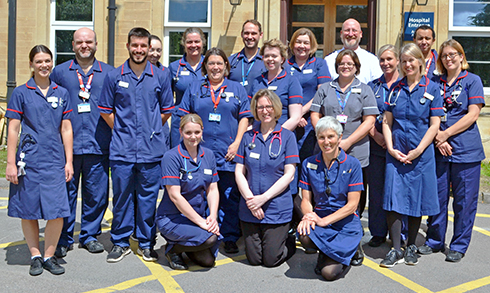Media Release
Date: 19 July 2019
RUH celebrates 10th anniversary of Medical Nurse Practitioners
The Royal United Hospitals Bath NHS Foundation Trust (RUH) is celebrating 10 years since it introduced a valuable new nursing role that has made a huge difference across the hospital - Medical Nurse Practitioners.

Medical Nurse Practitioners (MNP) work as part of the multidisciplinary medical team, working alongside junior doctors, consultants and nurses across all clinical settings, dependent on their area of expertise.
An MNP is an experienced and highly educated registered nurse who undergoes further training to manage the complete clinical care for their patient, including assessing, diagnosing and treating patients with complex multi-dimensional problems.
When the role was first introduced at the RUH, one of the first hospitals in the country to do so, seven MNPs were appointed. Today there are 40 working across the medical division of the Trust - Cardiology, Gastroenterology, Respiratory, Endocrinology, General Medicine and Older Persons Unit. There are also nurse practitioners working in the Surgical department and Women and Children's division.
Samantha Jones, one of the Trust's first MNPs and who works in Cardiology, said: "Before I became a MNP, I was a junior sister and was looking to develop my skills and progress my career. When I heard about the MNP role, it sounded like the perfect position for me - it was an opportunity to take a step up but also stay clinical and develop a different set of skills.
"Since being in my role, I've gained a wealth of knowledge and skills and my role has grown to working across all areas of cardiology.
"As I work alongside consultants and junior doctors, I find that we bring a different perspective to making decisions whilst caring for our patients. You could say that we are the 'glue' between doctors and the nursing team.
"We run the rota for the junior doctors, and support them as they work on a four-month rotation. We're able to spend that extra bit of time with them explaining how we do things and answer questions. We also have developed good working relationships with the ward sisters and we are here to support our nursing colleagues.
"My mantra is 'can I do that?' and I've found myself saying 'yes' in this role - I've pushed the boundaries and am proud of what I've achieved over the past 10 years."
Philippa Nash, another of the original MNPs appointed 10 years ago, said: "It's been amazing what we have achieved as MNPs. We have been very proactive in growing the role and are well-established within the nursing teams. "We have developed our skills, become highly experienced and have taken on new responsibilities. For example, we write new protocols and develop the way we work. The MNP role is also expanding across the Trust into Haematology so we have a MNP in every speciality within medicine.
"To anyone thinking about becoming a MNP, I would say to them that it's a fantastic role and it is ideal if you want to stay working on a ward, but work to a much higher clinical level. You're constantly learning, you're clinically valued and you feel part of both the nursing and medical teams, which is great."
Another of the original MNPs, Nic Aplin, said: "It's been a great development role working on the wards and I look forward to further developing my skills for the next 10 years."
Head of Nursing Medicine, Mandy Rumble, said: "It has been fantastic to see the development of these staff and their roles within the Medical Division. They have become an integral part of the clinical team.
"The Trust has shown continuing commitment to developing nursing staff and developing alternative roles."
ENDS
Notes to Editor
- The Royal United Hospitals Bath NHS Foundation Trust provides acute treatment and care for a catchment population of around 500,000 people in Bath, and the surrounding towns and villages in North East Somerset and Western Wiltshire. The hospital provides healthcare to the population served by four Clinical Commissioning Groups: Bath & North East Somerset CCG, Wiltshire CCG, Somerset CCG and South Gloucestershire CCG.
- The Trust has 759 beds and a comprehensive range of acute services including medicine and surgery, services for women and children, accident and emergency services, and diagnostic and clinical support services.
- In 2015 The Royal United Hospitals NHS Foundation Trust acquired the Royal National Hospital for Rheumatic Diseases (RNHRD) NHS Foundation Trust. The RNHRD treats patients from across the country offering services in rheumatology, chronic pain, chronic fatigue syndrome/ME, cancer related fatigue and fatigue linked to other long term conditions such as multiple sclerosis.
- The RUH is changing - we have an exciting programme of redevelopment underway transforming our site and further improving the services we provide. The Trust is building a purpose built RNHRD and Therapies Centre and is now working towards a new Dyson Cancer Centre. For more details visit: www.ruh.nhs.uk/fit4future

